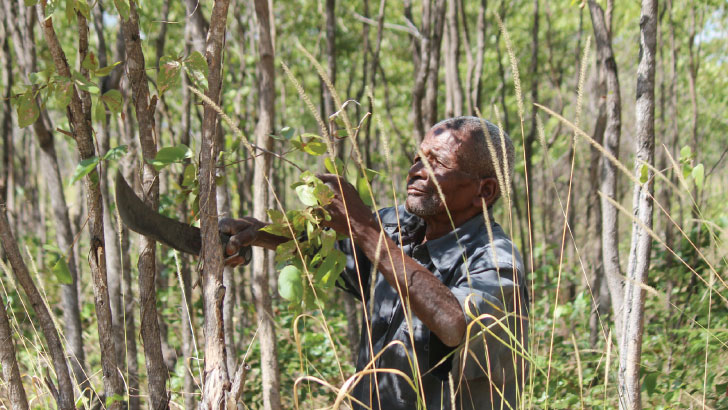Achieving resilience with natural regeneration
Fifty-two-year-old Lemekezani Petulo from Mtengula Village, Traditional Authority (T/A) Symon in Neno District used to toil in vain because his fields failed to produce food.
“Maize and beans could just wilt despite doing all the necessary farm work even amid favourable rainfall,” he says.
But for 17 years, the father of seven kept tilling the land that could not honour his sweat.
Petulo’s household’s situation worsened with the negative effects of climate change. It experienced perennial hunger and got stuck in abject poverty.
He says the family’s food production efforts were frustrated.

“The other constant problem was the raging run-offs that washed away the fields. Hot weather conditions which led to dry spells also dominated the growing seasons,” Petulo recounts.
The unfortunate situation was blamed on rampant environmental degradation, which Food and Agriculture Organisation of the United Nations says makes the country vulnerable to the effects of climate-related weather shocks.
To address the situation, from 2004 non-State actors engaged the communities in T/A Symon’s area on reforestation drives.
Tree nurseries were established with many seedlings planted, but Petulo says none survived.
“All the trees wilted within two weeks of planting,” he says.
It then became clear that the land on which Petulo toiled was poor and unsuitable for crop production.
However, forest cover dominated by mopane (tsanya) trees is blossoming. Acres of these indigenous trees surround his house.
“I just gave up on farming and these trees sprouted naturally,” he says while pruning one in his forest.
Since 2018, through farmers’ management natural resources regeneration practice, World Vision Malawi is engaging the locals to conserve the environment.
The intervention encourages the communities to preserve the environment by embracing the natural regeneration of trees and shrubs.
Petulo’s family now understands the significance of safeguarding the ecosystem, which also contributes to achieving sustainable development goals to end poverty and hunger by 2030.
His wife Margaret says the initiative raised their resilience.
“In three years, the trees have grown spontaneously that we benefit a lot as they thrive. Their presence curbed the raging runoffs, helping us to have a safe home for our children to grow” she says.
Margaret now cherishes the proximity of forests, saying the burden of long-distance walks she endured with her children to fetch firewood is gone.
To lessen the pressure on the forests, the household uses an energy-efficient cooking stove locally known as chitetezo mbaula.
Ethel, one of their daughters, says the intervention has nurtured her environmental-conscious mindset.
“The importance of trees cannot be overemphasized. I have peace of mind knowing we are protected from natural disasters,” she says with a grin.
The family has also achieved food security with World Vision Malawi’s technical support that improved irrigation farming in Chifide Irrigation Scheme in the area.
The organisation constructed three canals that channel water from Shire River into arable land on the banks of this country’s largest waterway.
Petulo and other 381 farming families have switched from rain-fed agriculture to irrigation farming that enables them to harvest thrice a year.
The 115-hectare irrigation scheme is improving food security and economic status of people in this part of Neno District.
“The benefits are enormous that I am motivated to take care of the trees up here to prevent soils from being eroded into Chifide,” says Petulo.
Another subsistence farmer Austin Mfundenji says the thriving forests have made clear the importance of conserved environment to their viable existence.
World Vision Malawi Matope Area Programme development facilitator Ernest Chipata says they strive to engage the communities in sustainable activities to build their resilience.
“We are impressed the intervention is improving the well-being of children as the families are safe, self-reliant and give them (children) the basic needs,” he says.





